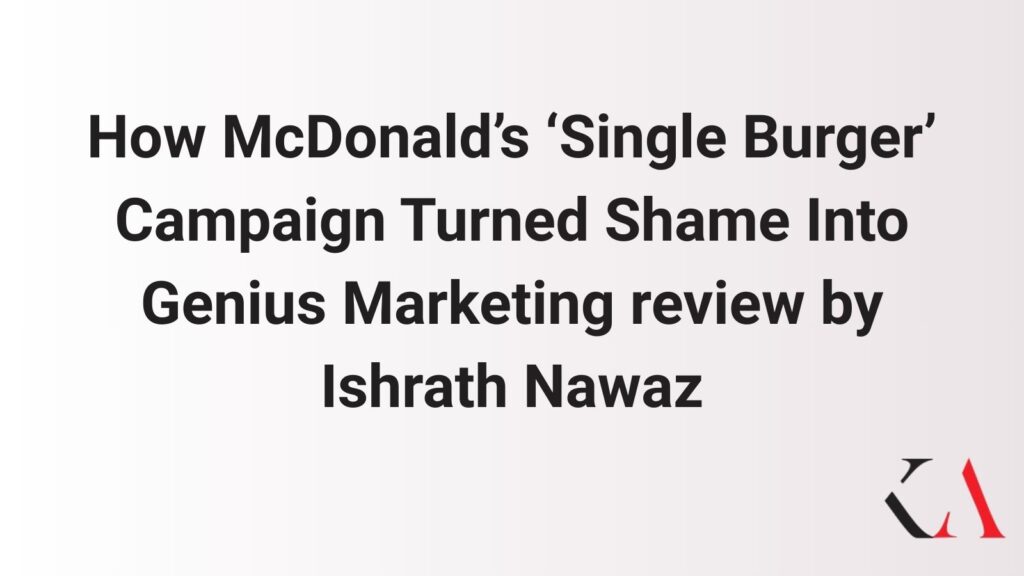How McDonald’s ‘Single Burger’ Campaign Turned Shame Into Genius Marketing review by Ishrath Nawaz

The McDonald’s “Single Burger” campaign turned cultural stigma into humor, built trust with younger audiences, generated viral earned media, and created an authentic experience that boosted store visits by 3–4 times, proving that humor-driven authenticity can drive real business growth.
The Campaign That Flipped the Script
When most brands face criticism, they try to deny or avoid it. But McDonald’s in Italy chose a bolder route. For years, eating at McDonald’s carried a sense of shame in a country where traditional cuisine is a matter of pride. Instead of brushing this off, McDonald’s cleverly made the “shame” itself the centerpiece of its new campaign.
In this Mcdonald campaign review by Ishrath Nawaz, the brilliance lies in how the brand turned embarrassment into a shared laugh. By launching the “Single Burger” campaign, McDonald’s didn’t run away from its weakness—it embraced it with humor. The result was not just a funny ad, but a cultural conversation that instantly connected with audiences.
Humor That Built Authenticity
Younger audiences, especially Gen Z, are not impressed by polished perfection. They value honesty, relatability, and authenticity. This is why the Mcdonald campaign review by Ishrath highlights how powerful this approach was. By laughing at itself, McDonald’s proved it wasn’t afraid to admit its flaws.
The message was simple but effective: “Yes, sometimes people feel awkward eating here, and we get it—we’re in on the joke with you.” This shift in tone made McDonald’s more relatable and trustworthy. According to a Mcdonald campaign review by Kabrand Consulting, brands that dare to acknowledge their flaws often end up building stronger, longer-lasting loyalty with their customers.
From Joke to Media Sensation
Another reason this campaign became iconic is because it spread organically. McDonald’s didn’t rely solely on huge ad spends; instead, it trusted the strength of the idea itself.
Media outlets covered the campaign widely, influencers joined the conversation, and customers shared the joke online. This wave of earned media turned what could have been a small, local idea into an international talking point. In this Mcdonald campaign break down, Ishrath shows how the campaign transformed a cultural weakness into a viral strength—one that required far less money than traditional advertising.
More Than a Burger: A Cultural Experience
Ordering the “Single Burger” was more than a simple purchase. It became an experience that customers wanted to be part of. Eating the burger meant joining a cultural joke, one that everyone was in on.
This is what makes the campaign different: McDonald’s wasn’t just selling food, it was staging a cultural performance. Customers weren’t passive—they were participants. That’s why the Mcdonald campaign review by Ishrath Nawaz refers to it as a kind of “brand theater,” where consumers engage with the brand on an emotional level. People don’t just remember the product; they remember the shared laugh and the story behind it.
Real-World Results That Spoke Volumes
Creativity is great, but the real test of any campaign is in the results. The “Single Burger” campaign delivered beyond expectations: McDonald’s reported a 3–4X increase in store visits following the launch.
This wasn’t just a funny ad. It was a powerful driver of customer behavior. As highlighted in this Mcdonald campaign review by Ishrath, the campaign proved that humor and authenticity aren’t just branding tools—they can directly impact sales and footfall.
The Key Lessons for Marketers
What can marketers learn from this? According to this Mcdonald campaign review by Ishrath Nawaz, the “Single Burger” campaign teaches us several important lessons:
- Flaws can be strengths: Instead of hiding weaknesses, smart brands turn them into opportunities.
- Authenticity beats perfection: Modern audiences value honesty far more than glossy perfection.
- Earned media is priceless: A clever idea can travel further than an expensive ad budget.
- Experiences are more memorable than ads: Customers don’t just buy products, they join stories.
- Humor sells: Relatability and laughter build stronger emotional connections.
The Mcdonald campaign review by Kabrand Consulting adds that embracing imperfection often makes a brand more human, and in turn, more lovable.
Final Thoughts
The Mcdonald campaign review by Ishrath Nawaz shows that the “Single Burger” campaign was much more than a quirky product launch. It was a cultural statement that turned a perceived weakness into a viral success.
By leaning into humor, authenticity, and relatability, McDonald’s not only shifted public perception but also achieved real business impact. This wasn’t just advertising—it was innovative storytelling. It proved that when brands stop pretending to be perfect and start being human, they connect with customers on a deeper level.
The genius of this campaign lies in its simplicity: take a cultural truth, embrace it with humor, and transform it into a movement. That’s the kind of marketing that doesn’t just sell products—it creates loyalty, laughter, and love.